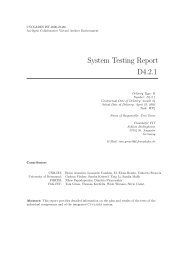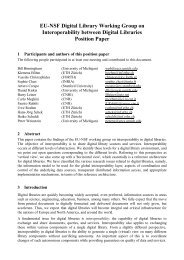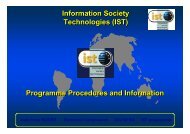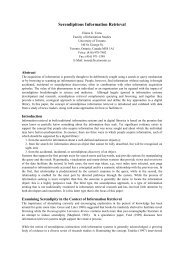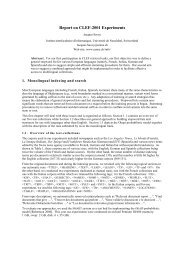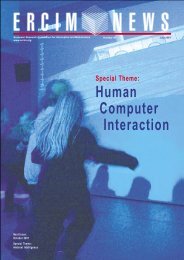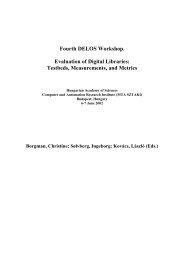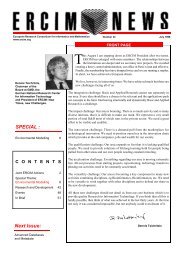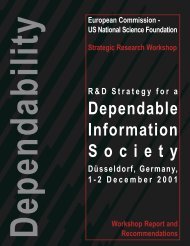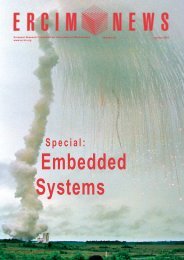Annual Report 2002 - ERCIM
Annual Report 2002 - ERCIM
Annual Report 2002 - ERCIM
Create successful ePaper yourself
Turn your PDF publications into a flip-book with our unique Google optimized e-Paper software.
Dependable Software-Intensive Systems<br />
The dependability aspect of embedded systems is of the utmost importance, and <strong>ERCIM</strong><br />
members have identified a huge potential with respect to this. Accordingly, the new <strong>ERCIM</strong><br />
member AARIT, within which ARCS is an important driving force, has proposed and<br />
initiated an <strong>ERCIM</strong> Working Group on ‘Dependable Software-Intensive Embedded Systems’.<br />
Each day, our lives become more dependent on<br />
‘embedded systems’, digital information technology<br />
that is embedded in our environment. This includes<br />
not only safety-critical applications such as automotive<br />
devices and controls, railways, aircraft, aerospace<br />
and medical devices, but also communications,<br />
‘mobile worlds’ and ‘e-worlds’, the ‘smart’ home,<br />
clothes, factories etc. All of these have wide-ranging<br />
impacts on society, including security, privacy and<br />
modes of working and living. More than 98% of processors<br />
applied today are in embedded systems, and<br />
are no longer visible to the customer as ‘computers’ in<br />
the ordinary sense. New processors and methods of<br />
processing, sensors, actuators, communications and<br />
infrastructures are ‘enablers’ for this very pervasive<br />
computing. They are in a sense ubiquitous, that is,<br />
almost invisible to the user and almost omnipresent.<br />
The European Context<br />
The European Commission has recognised the importance<br />
of embedded systems by creating a new unit in<br />
the IST Directorate. The visions surrounding the<br />
AMI-space (embedded systems everywhere,<br />
described in the context of human life as ‘ambient<br />
intelligence’) have considerably influenced the 6th<br />
Framework Programme of the IST domain. In this<br />
issue we focus on hard real-time, dependability/safety<br />
and AMI-scenario applications. There also exists a<br />
separate strategic objective on embedded systems in<br />
the work program 2003-2004, namely, to develop the<br />
next generation of technologies and tools for modelling,<br />
design, implementation and operation of hardware/software<br />
systems embedded in intelligent<br />
devices. An end-to-end systems vision should allow<br />
cost-efficient systems to be built with optimal performance,<br />
high confidence, reduced time to market and<br />
faster deployment. The focus is on:<br />
• Middleware and platforms for building networked<br />
embedded systems that aim to hide the complexity<br />
of underlying computing, communications, sensing<br />
and control, while at the same time providing efficient<br />
and effective distribution of resources at low<br />
cost<br />
• Concepts, methods and tools for system design and<br />
development of warrantable software components<br />
and implementation of systems<br />
• Advanced controls for real-time systems.<br />
This strategic objective is covered in the second call<br />
(15 June to 15 October 2003). The Working Group is<br />
involved in a large IP proposal (Integrated Project,<br />
one of the new instruments of European funded<br />
research) called DECOS, Dependable Embedded<br />
Components and Systems.<br />
The Working Group currently includes members from<br />
Austria (ARCS/AARIT), France (INRIA), Germany<br />
(FhG), Greece (FORTH), Italy (CNR, PDCC),<br />
Luxembourg (IST), Netherlands (CWI), Norway<br />
(NTNU) and Sweden (MRTC/SICS). Others are very<br />
welcome.<br />
At the moment, all themes relating to embedded systems<br />
are of interest to the Working Group (WG), which<br />
focuses on specific topics case by case. The work<br />
program includes:<br />
• experience exchange<br />
• joint position papers on relevant issues<br />
• information exchange with organisations, other WGs<br />
and committees in which <strong>ERCIM</strong> members are<br />
already active<br />
• decision building processes<br />
• WG meetings adjacent to other relevant<br />
meetings/conferences<br />
• discussion board (via <strong>ERCIM</strong> website or a member’s<br />
website)<br />
• contributions to <strong>ERCIM</strong> News<br />
• one major event per year (may be combined with<br />
some important meeting or conference)<br />
• cooperation within the EU Framework Programs<br />
(NoE, IP); currently Dependability (1st Call) and<br />
Embedded Systems (2nd Call)<br />
• cooperation in standardisation and awarenessbuilding<br />
processes.<br />
11



